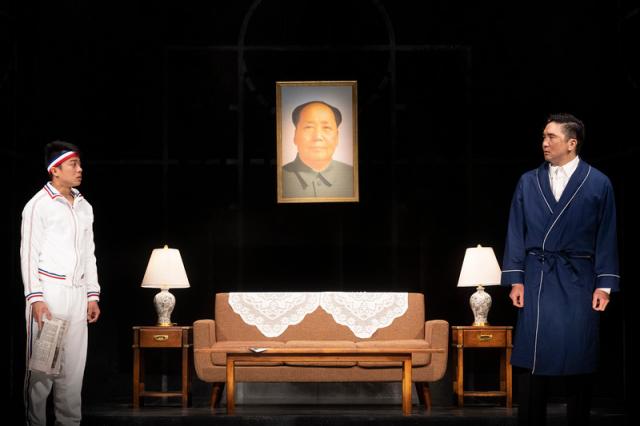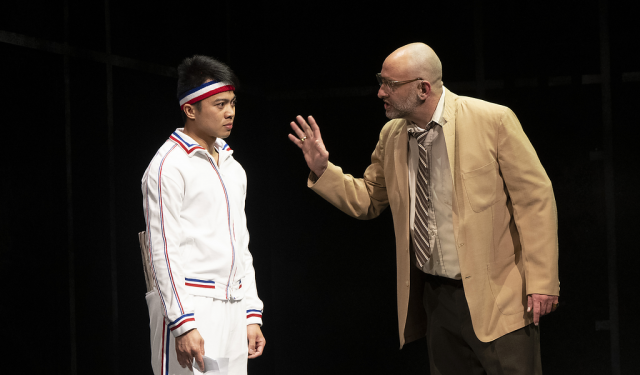

As part of the years China took The Great Leap to be an International leader, 1958 up to 1989, China invited and hosted Americans in sports exhibition games against its top players. Lauren Yee’s play, The Great Leap, features a school basketball team from San Francisco in such a competition in 1989. The piece focuses, though, on both competitors’ coaches and particularly a seemingly unlikely U.S. player of Chinese descent. So doing, it reveals not only personal histories but links up with major political ones that span decades.
Glenn Obrero’s engaging Manford is a determined S.F. basketball player, short in height and of family (his remote mom’s just died) and friends. Manford does have a phenomenal free shot ability as well as ambition, spunk, and forwardness. Will he have enough talent to get on the team, and will he win a spotlight? Will he also garner encouragement to pursue a better future from smart, lovely Connie (made-for-the-part Helen Joo Lee)? She cares for him emotionally but also actively for his well-being.
“It’s always your turn” is a phrase used throughout the play. Self-centered, win-at-all-costs but aging Coach Saul (made likeable by Gregg Weiner even when Saul’s gruff and foul-mouthed) says the phrase to encourage someone to steal action. Playwright Yee often uses it to designate a shift of emphasis to a successive character. First it’s to deepen the depiction of Saul. He thinks of himself as having introduced American basketball to China. Never mind that Mao at the time was already a fan of the sport. When it becomes possible that Saul will give Manford his turn to be on the 1989 team, Saul says, “It’s only four days” in China, so “What could go wrong?”
Next Greg Watanabe’s impressive Wen Chang gets his turn. He demonstrates how he learned perfect English that brought him to be a translator for Saul on his first stay in China. But Saul’s mentoring of Wen Chang didn’t afterward help him avoid political “rural re-education” for 5 years. When that ended, a politically changed Wen Chang received favors and appointments that involved translating. He’s now been made spokesman in English for the Chinese party and its basketball team, as its Coach.
As soon as the American team arrives in China, it’s the playwright’s turn to have the two coaches explain separately and together their personal relationships, past and present. It’s learned that Wen Chang had a significant friendship with a star member of Saul’s first visiting team. Suddenly, Manford gets his turn to win attention: He’s unwittingly drawn into a political street protest favoring democratic America over the Chinese government.
It is only days before the Tiananmen Square protests when the American high school basketball team meets the experienced professional Chinese players. Whose turn is it to win the game? And how will the dramatic characters take part in it and even the aftermath? What’s the final ending?
In presenting The Great Leap, the set and projection designers work very well with each other to achieve the predominant visual metaphor for a basketball court. In it dramatic action takes place after overlays of outside and even street activity. Director Vanessa Stalling has blocked all beautifully, while adding narrative and some personal activities scenes down front and out of the court-and-street ones.
Varied lighting by Keith Parham and strong sound design by Jeffrey Levin are of paramount importance in achieving smooth transitions of place, time, action, and mood. Theresa Ham’s costumes nicely convey periods of time as well as personalities and functions of the characters. Asolo Rep’s always-reliable Michelle Hart provides correct make-up, wigs, and hair fashions.
If The Great Leap stumbles at times, it’s because Lauren Yee doesn’t convey many of the obstacles and even routine actions her characters would have had to deal with in 1989 in both the U. S. and China. The important game scoring is presented more like that of a quiz show finale than a real sports one. Motivation for some actions of the characters—notably Connie—is occasionally weak or, as in the final scene with Wen Chang, inadequately prepared for. But there’s nothing weak in the acting of Asolo Rep’s fine cast. It’s totally laudable.
